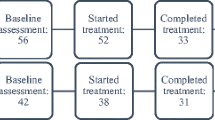Abstract
The experience of chronic pain can be associated with significant distress and disability; however, this is not always the case. Although attempts to control or reduce pain can be helpful for many pain sufferers, on some occasions this is not an effective option and a different response is required. This different response can include a fiexible mix of control and acceptance. The acceptance part of this mix entails a willingness to have pain, or other uncomfortable private experiences, without taking action to control or eliminate them. At least 15 laboratory and clinical studies make the growing case for the role of acceptance in the functioning of people with chronic pain, and evidence from treatment outcome studies is promising. It appears that acceptance-related processes will at least expand our range of psychologic treatment methods for chronic pain sufferers and, at best, significantly improve them.
Similar content being viewed by others
References and Recommended Reading
McCracken LM, Carson JW, Eccleston C, Keefe FJ: Topical review: acceptance and change in the context of chronic pain. Pain 2004, 109:4–7.
Fordyce WE: Behavioral Methods for Chronic Pain and Illness. St. Louis: C. V. Mosby; 1976.
Roberts AH, Sternbach RA, Polich J: Behavioral management of chronic pain and excess disability: long-term follow-up of an outpatient program. Clin J Pain 1993, 9:41–48.
Turk DC, Meichenbaum D, Genest M: Pain and Behavioral Medicine: A Cognitive-Behavioral Perspective. New York: The Guilford Press; 1983.
Flor H, Fydrich T, Turk DC: Efficacy of multidisciplinary pain treatment centers: a meta-analytic review. Pain 1992, 49:221–230.
Morley S, Eccleston C, de Williams AC: Systematic review and meta-analysis of randomized controlled trials of cognitive behaviour therapy and behaviour therapy for chronic pain in adults, excluding headache. Pain 1999, 80:1–13.
Hayes SC, Strosahl KD, Wilson KG: Acceptance and Commitment Therapy: An Experiential Approach to Behavior Change. New York: The Guilford Press; 1999a. This book provides a thorough introduction to a contemporary functional contextual model of human suffering and behavior change and presents many examples of clinical methods and a number of clinically relevant examples.
Hayes SC: Acceptance and commitment therapy, relational frame theory, and the third wave of behavioral and cognitive therapies. Behav Ther 2004, 35:639–665. Provides a review of recent theoretical and clinical developments in the field of psychology generally. Published studies from a variety of clinical settings are included in this review.
McCracken LM: Contextual Cognitive-Behavioral Therapy for Chronic Pain. Seattle: IASP Press; 2005. This book provides an overview of the application of contextual approaches to individuals with chronic pain. Specific experiential exercises and clinical material are included.
McCracken LM, Vowles KE, Eccleston C: Acceptance of chronic pain: component analysis and a revised assessment method. Pain 2004b, 107:159–166. A revised version of the Chronic Pain Acceptance Questionnaire is presented. Evidence is provided for the use of the measure, and identified subscales, in relation to other measures of patient functioning.
McCracken LM: Behavioral constituents of chronic pain acceptance: results from factor analysis of the Chronic Pain Acceptance Questionnaire. J Back Musculoskeletal Rehabil 1999, 13:93–100.
Rosenstiel AK, Keefe FJ: The use of coping strategies in chronic low back pain patients: relationship to patient characteristics and current adjustment. Pain 1983, 17:33–44.
McCracken LM, Eccleston C: Coping or acceptance: What to do about chronic pain? Pain 2003, 105:197–204.
McCracken LM, Eccleston C: The relative utility of copingbased versus acceptance-based approaches to chronic pain. Eur J Pain 2006, 10:23–29.
McCracken LM, Eccleston C, Bell L: Clinical assessment of behavioral coping responses: results from a brief inventory. Eur J Pain 2005, 9:69–78.
Ciof, D, Holloway J: Delayed costs of suppressed pain. J Pers Soc Psychol 1993, 64:274–282.
Sullivan MJ, Rouse D, Bishop S, Johnston S: Thought suppression, catastrophizing, and pain. Cog Ther Res 1997, 21:555–568.
Feldner MT, Hekmat H, Zvolensky MJ, et al.: The role of experiential avoidance in acute pain tolerance: a laboratory test. J Behav Ther Exp Psychiatry 2005 [Epub ahead of print].
Hayes SC, Bissett RT, Korn Z, et al.: The impact of acceptance versus control rationales on pain tolerance. Psychological Record 1999, 49:33–47.
Gutiérrez O, Luciano C, Rodríguez M, Fink BC: Comparison between and acceptance-based and a cognitive-control-based protocol for coping with pain. Behav Ther 2004, 35:767–783.
McCracken LM: Learning to live with the pain: acceptance of pain predicts adjustment in persons with chronic pain. Pain 1998, 74:21–27.
McCracken LM, Spertus IL, Janeck AS, et al.: Behavioral dimensions of adjustment in persons with chronic pain: pain-related anxiety and acceptance. Pain 1999, 80:283–289.
Viane I, Crombez G, Eccleston C, et al.: Acceptance of the unpleasant reality of chronic pain: effects upon attention to pain and engagement in daily activities. Pain 2004, 112:282–288.
McCracken LM, Eccleston C: A prospective study of acceptance of pain and patient functioning with chronic pain. Pain 2005, 118:164–169.
Kabat-Zinn J, Lipworth L, Burney R: The clinical use of mindfulness meditation for the self-regulation of chronic pain. J Behav Med 1985, 8:163–190.
Dahl J, Wilson KG, Nilsson A: Acceptance and commitment therapy and the treatment of persons at risk for long-term disability resulting from stress and pain symptoms: a preliminary randomized trial. Behav Ther 2004, 35:785–802.
McCracken LM, Vowles KE, Eccleston C: Acceptance-based treatment for persons with complex, longstanding chronic pain: a preliminary analysis of treatment outcome in comparison to a waiting phase. Beh Res Ther 2005, 43:1335–1346.
Author information
Authors and Affiliations
Corresponding author
Rights and permissions
About this article
Cite this article
McCracken, L.M., Vowles, K.E. Acceptance of chronic pain. Current Science Inc 10, 90–94 (2006). https://doi.org/10.1007/s11916-006-0018-y
Issue Date:
DOI: https://doi.org/10.1007/s11916-006-0018-y




